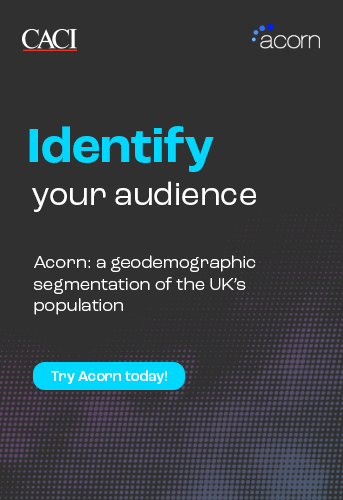How is Acorn different from social grade ABC1 C2DE?

What does social grade ABC1 & CD2E mean?
The National Readership Survey (NRS) social grade was introduced in the UK in the 1950s as a way of classifying people based on the formal education and occupation of the head of the household. This came under the assumption that an individual’s education and occupation could strongly indicate their social status.
While there are six categories that the population can be divided into, the most familiar are the classifications of individuals being in Groups ABC1 (middle class) or C2DE (working class). This system has been widely used by advertising and market research organisations over the years in an attempt to target specific socio-economic groups for products and services.
What are the defining characteristics of the ABC1 demographic?
According to YouGov, the ABC1 demographic comprises 57% of the British population. Individuals within the ABC1 social grade demographic likely hold professional or managerial positions in their careers and have completed higher education. They tend to have a higher income, resulting in increased access to housing and healthcare.
What are the defining characteristics of the C2DE demographic?
The remaining 43% of the British population, those within the C2DE demographic are likely to have semi-skilled jobs and may not have completed higher education. Their incomes are typically lower than that of ABC1, and they are likelier to experience difficulties in accessing housing and healthcare.
What is the difference between Acorn and social grades ABC1 & C2DE?
- The NRS social grades ABC1 and C2DE differ from Acorn in that Acorn can segment the UK population into up to 64 distinct Types, which enables micro-targeting.
- With Acorn, you can identify the types of people who live in an area down to full postcode level. The NRS ABC1 C2DE classification doesn’t have any way of identifying the locations of the demographic classifications.
- Each Acorn segment describes the type of people who live in a postcode in a granular way, including their characteristics, behaviours, family type and property information.
- Acorn can help organisations identify where different segments reside in the country and provide an understanding of the key segments that make up a consumer base, which is far beyond the profiling capabilities of the NRS social grading.
- With vast amounts of supporting information available about each of the Acorn segments, organisations can truly get under the skin of the motivations of each consumer group to target their products or services accordingly.
Ultimately, when it comes to NRS social grades, individuals often view their class differently than the implications suggested by their social grade. On the contrary, the granular detail and accuracy supplied via Acorn ensures that every type of individual from every type of household and circumstance will be accounted for.
Find out how Acorn can enhance your customer segmentation capabilities by trying it out for yourself or contact us to learn more.




